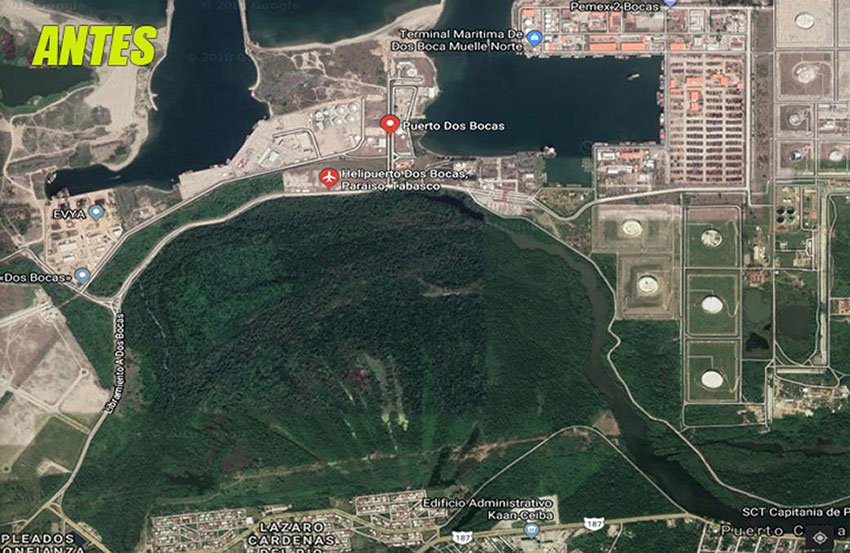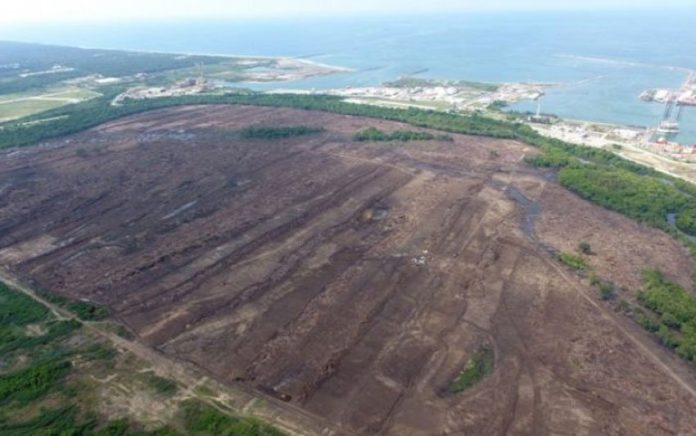The removal of mangroves at the site of the federal government’s new oil refinery in Tabasco has made the land more susceptible to flooding, raising questions about its suitability for the US $8-billion project.
Between September 8 and October 1 last year, 230 hectares of mangroves and other vegetation were cleared from the refinery site on the Gulf of Mexico coast at Dos Bocas, a port town in the municipality of Paraíso.
The Mexican Center for Environmental Law (Cemda) said that neither environmental authorization nor permission to change the land use of the site was granted before the preparatory work began and consequently filed complaints with federal authorities.
In December, Mexico’s energy sector watchdog ordered that all work that alters the condition of the land must immediately cease but by that time the site was already flooding.
The newspaper El Universal reported that flooding began in October and that water has ebbed and flowed since, covering parts of the site.

Satellite images showed that flooding decreased in February but increased again in March.
When President López Obrador attended a groundbreaking ceremony on December 9, he didn’t actually set foot on the refinery site because it was flooded, El Universal said.
The flooding problem was not unforeseen.
A 2011 environmental impact statement completed as part of a project to expand the port terminal at Dos Bocas said the land was not usable because it has flood-prone areas.
“The mangrove functioned as a natural seawater filter. By removing it, not only will that plot of land flood, it’s very probable that adjacent areas such as Puerto Ceiba and the neighborhood of Lázaro Cárdenas will flood. The area is going to turn into an enormous swamp,” said Fernando Álvarez Noguera, a researcher at the biology institute of the National Autonomous University (UNAM).
“Mangroves also function as a natural barrier against hurricanes, they have strategic importance for the life of the coast, that’s why they’re protected,” he added.
Álvarez, an author of a book about biodiversity in Tabasco, explained that when the tide rises seawater will now flow into the site and neighboring areas unimpeded. He warned that remaining vegetation will be damaged by the salt water.
The researcher also said that emissions from the new refinery will contaminate the air and that runoff could pollute the nearby Mecoacán Lagoon, where oysters are farmed.
The refinery, which the government announced this week will be built by the state oil company and the Secretariat of Energy, will also likely pose a risk to coastal animals.
Wildlife expert Marcelo Aranda has confirmed that iguanas, toads, crabs, coatis and tlacuaches (opossums), among other animals, live in the area. Crocodiles, turtles, deer and birds also inhabit coastal land near the refinery site.
By choosing to pursue the refinery project at Dos Bocas the government is ignoring 10-year-old advice from the state-owned Mexican Institute of Petroleum (IMP).
A 2008 IMP report warned that building oil infrastructure in the municipality of Paraíso posed soil, environmental and social risks.
Out of seven sites identified as possible locations for a new refinery, Paraíso presented the “greatest risk” and therefore such a project there is “not recommended,” the IMP said.
Source: El Universal (sp)
